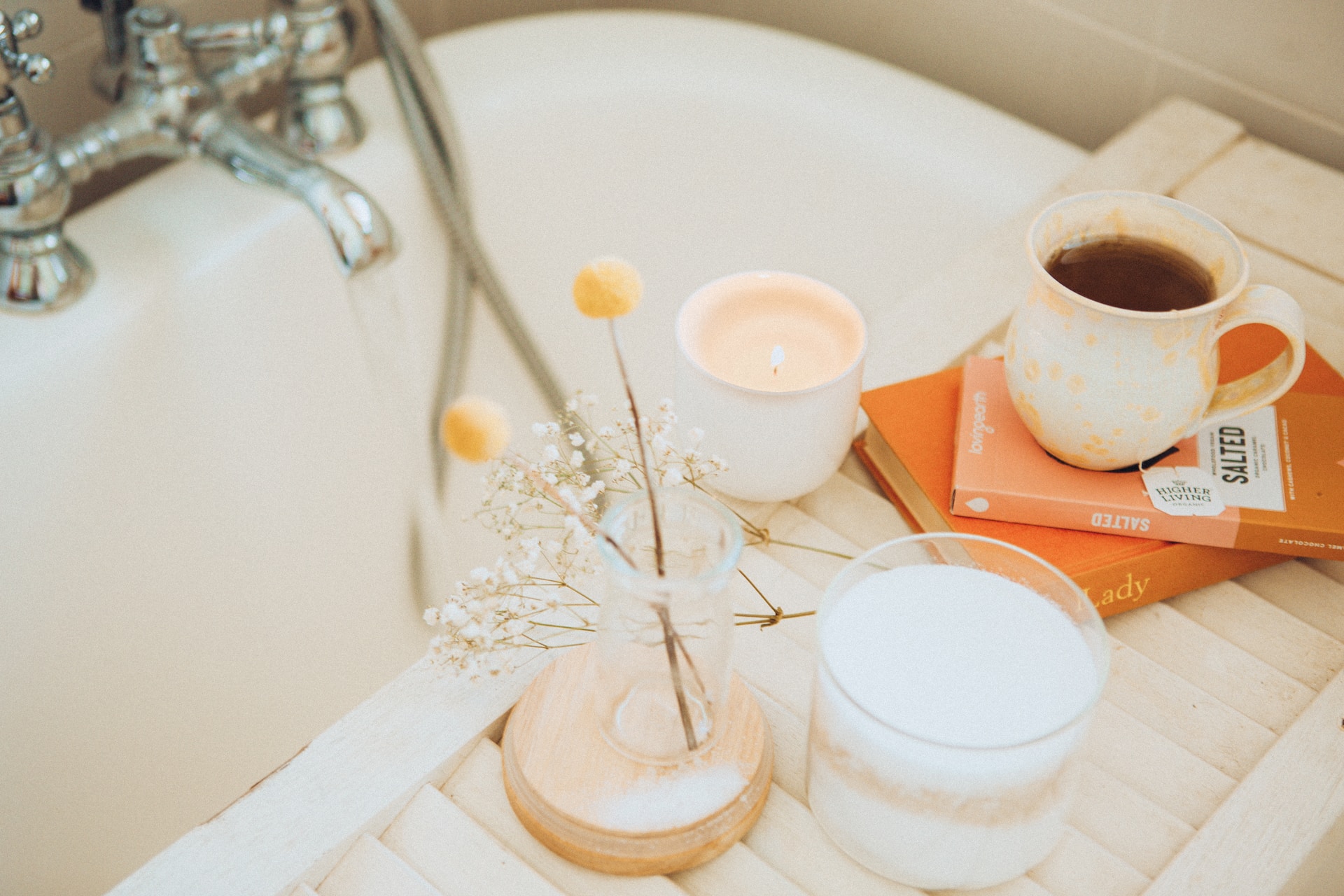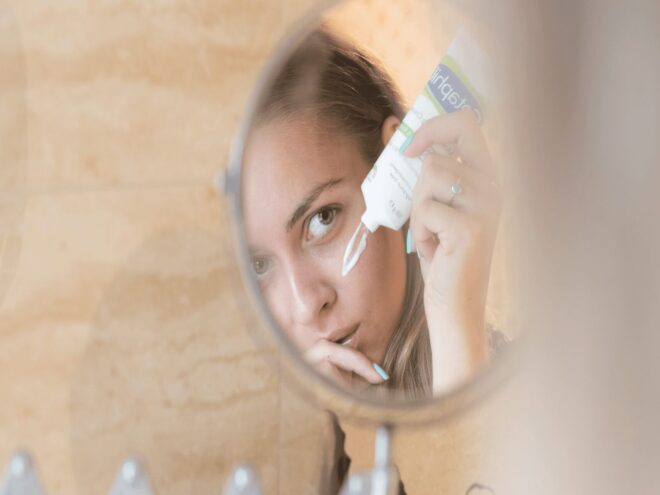Wellness • 07/30/2023
8 Incredible Self-Care Tips for Anxiety

Revivalist is a reader-supported endeavor and our posts may contain affiliate links. When you buy through links on our site, we may earn an affiliate commission.
Sometimes people romanticize the idea of anxiety. Although lounging in a hot bath might sound luxurious, there are no quick solutions for anxiety symptoms. A long-term approach to your well-being will help you live a more laid-back life. These are some of the best self-care tips for anxiety you can try at home.
What Is Self-Care?
Self-care is prioritizing your physical and mental wellness through daily habits. It’s a proactive way to take care of yourself. The best way to do this is by considering self-care practices and matching them to your interests or needs.
A one-time trip to the spa is a short-term form of self-care. Sustainable habits provide long-term relief, like journaling your daily worries to reflect on their roots. It often aids people struggling with chronic conditions like anxiety or depression.
Common Anxiety Symptoms
People with generalized anxiety disorder (GAD) may experience more symptoms than anxious thoughts or a racing heartbeat. If you feel on edge most days of the week, you may live with GAD symptoms like:
- Physical restlessness
- Insomnia or fatigue
- Trouble concentrating
- Irritability
- Muscle tension
Self-care can reduce the severity of these symptoms. Talk with your doctor if you think it’s a valuable tool for your daily life. They can help you pinpoint the best habits based on your anxiety history and current medications.
8 Self-Care Tips for Anxiety
Anyone can try these easy self-care tips for anxiety to enjoy their daily life more. They’ll become automatic habits that soothe your mental health if you attempt them frequently.
1. Journal Your Stream of Consciousness
Writing your thoughts in a journal may not seem like a powerful anxiety-fighting tool, but it is. You’ll put your most anxious thoughts on paper and read through them. It’s easier to find the roots of your daily worries when they’re in front of you. They transform from feelings to words, which share more evident commonalities.
Try journaling once a day in a physical notebook or throughout the day on your phone. Reflect on your entries to see what’s causing your various anxiety symptoms so you can better understand what your mind needs to relax.
2. Practice Breathing Exercises
People have crafted numerous types of breathing exercises over the centuries. Some are better for in-progress anxiety attacks, while others quiet your heart rate when you’re generally on edge.
Pick one of these exercises and try it when you’re uneasy. You could follow the four-part breath technique, which includes simple steps like:
- Exhale all of the air in your lungs.
- Slowly inhale for four seconds.
- Hold your breath for four seconds.
- Slowly exhale for four seconds.
- Repeat until your feel settled in your body.
You don’t need to attend expensive classes to practice breathing techniques. Try simple formats like this one at home to see if they help calm your physical anxiety symptoms.
3. Repeat Daily Affirmations
Saying positive affirmations aloud might seem strange at first, but it’s an excellent way to build self-confidence. Anxiety can become stronger when you don’t have enough self-esteem to spot your unfounded doubts or criticisms.
Make a list of three affirmations to repeat morning and night. By saying them out loud each day, you’ll foster a greater sense of confidence that supercharges your ability to help yourself heal.
4. Change Your Routine
Your current routine might make you more anxious by putting too many responsibilities on your shoulders. Try delegating your daily work by asking for help. You could also make a simple change, like adjusting the time you typically go grocery shopping.
These little changes are reminders that you’re not at the mercy of your routine. You have the power to change your life. It may also change the factors of your routine that cause your anxiety, like rushing to leave for work in the morning. If you make breakfast the night before, you’ll have a few extra minutes to leave early.
5. Exercise More Often
Exercise can be a significant source of help for people with anxiety. You don’t even have to do anything too intense to reap the benefits. Just get your heart rate up. Listen to your body and do what’s best for it, like an evening stroll or body-weight workouts.
Physical movement significantly reduces anxiety symptoms because it makes the brain produce dopamine and endorphins. You’ll instantly force your body to make the feel-good hormones that remove anxiety’s power over your mind.
6. Find a Sleep Aid
Anxiety feels more intense when the brain doesn’t get enough sleep to function at its best. Unfortunately, a lack of sleep is also a side effect of chronic anxiety.
See if you can find a sleep aid by experimenting with your nightly routine. You could start with a white noise machine to see if it distracts you from your negative thoughts. Make your bedroom cooler to bring your body temperature down.
You could also try a cannabidiol (CBD) product if your doctor approves. Researchers found that when people took CBD products of their choosing before bed, they fell asleep faster and stayed that way.
Ensure there’s no tetrahydrocannabinol (THC), as some brands mix the two. THC is the illegal psychoactive component in marijuana that will make you fail a surprise drug test and potentially cause hallucinatory symptoms you do not intend to experience.
7. Eat Anti-Inflammatory Foods
People with anxiety disorders have more neuroinflammation because their nervous system works overtime without many breaks, if any at all. You can reduce this inflammation by changing what you eat. Avoid eating foods known to irritate the nervous system, like:
- Fried foods
- High-carbohydrate foods
- Processed foods
- Foods high in sugar
- Processed meat
This is one of the best self-care tips for anxiety because it prioritizes your body’s biological needs. It’s not a diet that prioritizes beauty standards or other societal influences. Talk with your doctor or a nutritionist if you’re unsure how to plan a more nutritious diet for your mental health.
8. Meet With a Therapist
Therapists specialize in all mental health conditions, including anxiety. Meeting with one could help you talk through your current symptoms and heal from the people or events that triggered your anxiety condition initially. Research therapists in your area that work with anxiety patients. There may even be remote therapists able to meet you through video appointments.
Gain Greater Control of Your Mental Health
Now that you’ve read some of the best self-care tips for anxiety, consider what might help your quality of life. Getting better sleep, journaling your thoughts or delegating your responsibilities are all great places to start. Anxiety adapts to life’s ever-changing circumstances, so remember to keep an open mind as you seek long-term self-care habits.
Subscribe to Our Weekly Newsletter
We would love to connect deeper with you!


